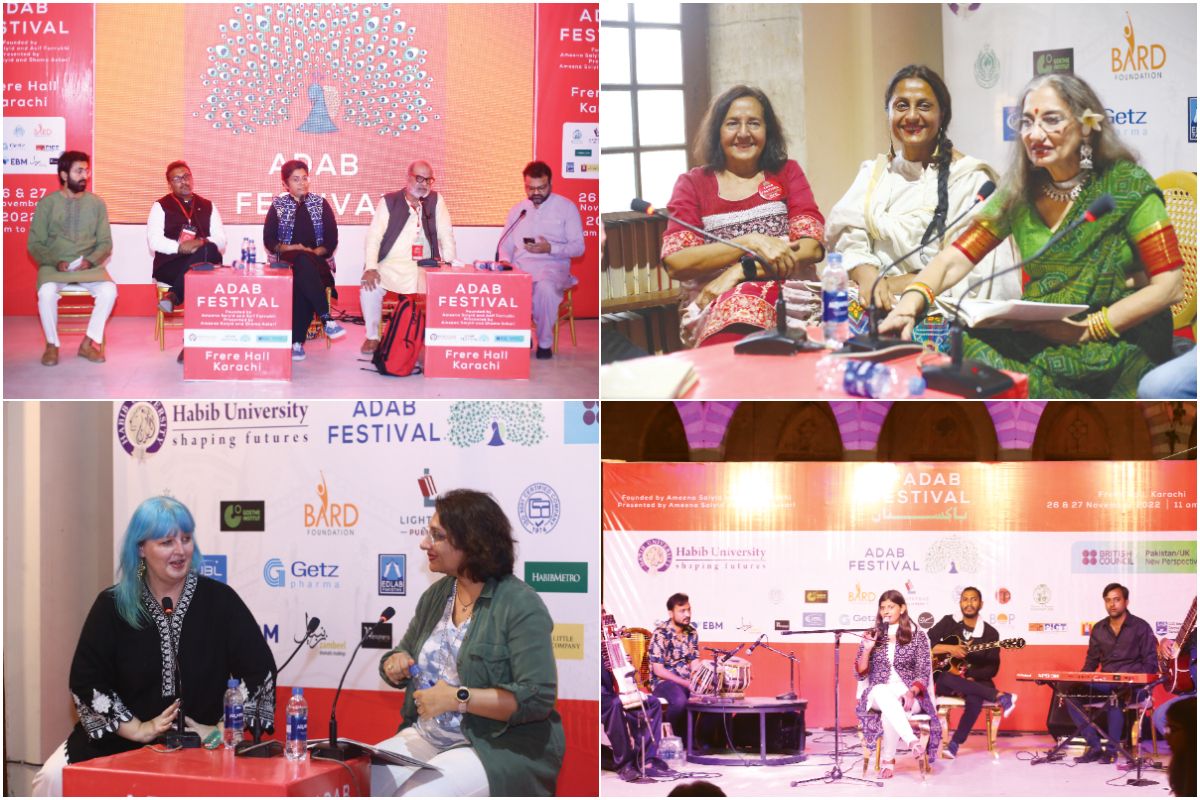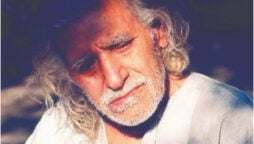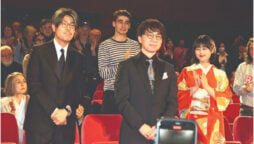
Adab Festival: more than just a literary affair
The focus of the fourth Adab Festival wasn’t entirely literary as many sessions ventured into uncharted terrain
Last weekend, the tree-lined driveway leading up to Karachi’s Frere Hall wasn’t as deserted as it usually is. The venue, which is a remnant of the city’s colonial past and now serves as a library and exhibition space, witnessed frenetic activity as people thronged the fourth Adab Festival. Literary festivals have become increasingly popular over the last decade or so and the two-day extravaganza provide a much-needed reprieve from the humdrum of city life.

The opening address
The inauguration ceremony was held at the British Council Hall — a tented central auditorium situated in the front lawn. After the National Anthem was sung, students of St Joseph’s Convent School sang the Adab Festival’s anthem. This year’s literary extravaganza focused on the theme of climate change and the keynote speakers drew attention to the gravity of the environmental catastrophes that have assailed Pakistan in recent years.
Federal Minister for Climate Change Sherry Rehman, the first keynote speaker, reflected on the insidious ways in which climate change had adversely impacted people’s personal choices. She also revealed that the industrial and agricultural sectors have faced considerable challenges owing to climate change. “For three years, Pakistan has been home to the hottest cities of the planet,” she said. Rehman added that the temperatures in these cities haven’t been conducive to agricultural and industrial activities.
She urged citizens to adopt a proactive role and view themselves as primary stakeholders in the struggle to tackle climate-related catastrophes. The federal minister argued that state involvement would be futile if the elite in urban centres don’t realise their ethical duty towards the environment. Rehman asserted that climate literacy, especially among children, was a key ingredient towards achieving positive change.
Environmentalist Tariq Alexander Qaiser, the other keynote speaker, also emphasised upon the existential challenges posed by global warming. In her welcome speech, Ameena Saiyid paid rich tribute to Asif Farrukhi, the co-founder of the festival who passed away in the summer of 2020. Urdu poet Zehra Nigah also spoke to audiences about the benefits of these festivals which, she believes, have fostered a spirit of creative freedom. “Such freedom is a blessing in these trying times,” she added.

Talking points
A whole spectrum of panel discussions and book launches were organised during the two-day festival. Novelist Moni Mohsin flew into the city to launch her new book The Impeccable Integrity of Ruby R. Journalist Peerzada Salman’s book Between the Ephemeral and the Eternal was also inaugurated. In addition, Yasir Latif Hamdani’s book on Quaid-e-Azam Muhammad Ali Jinnah was among the titles that were released. Storytelling sessions were also conducted during the two-day festival.
Through some sessions, literary pursuits were approached through an innovative lens. For instance, a noteworthy discussion highlighted the unique ways in which the surge in streaming services has altered the way books are being written. Asma Mundrawala and Saife Hasan performed a dramatic reading of the letters Faiz Ahmed Faiz and his wife Alys Faiz wrote to each other. The letters are tinged with both mundane reflections about day-to-day affairs, and heart-breaking meditations on his jail term and absence from home.
Yet, the focus wasn’t entirely on literary endeavours and a vast number of sessions ventured into uncharted terrain. A series of sessions about coastal urban resilience, stem-cell research, the plight of Pakistan’s economy and quality education were memorable and insightful.

Unique facets of Pakistani cinema were also emphasised. The most intriguing session in this regard was a panel discussion on Balochi cinema where clips from the film Doda were screened. Doda, which is set against the backdrop of Lyari, seems to have ended the rather long interlude that has beset Balochi cinema since the 1970s.
A large crowd attended the vibrant conversation between Aliya Iqbal Naqvi and award-winning filmmaker Sharmeen Obaid-Chinoy titled ‘The Stories We Show’. During this session, Obaid-Chinoy shed light on her experience of working on two episodes of Ms Marvel. After gaining accolades as a documentary filmmaker, she wanted to explore new vistas that could have a broader impact. When she discovered that the creators of Marvel were going to embark on the project, she wrote to them and emphasised the need for a Muslim woman to be portrayed as a superhero. She eventually pitched her ideas to them and got the job. “Ms Marvel gave me the opportunity to hire talented professionals from Pakistan and present the country’s talent,” she added.
Obaid-Chinoy added that Ms Marvel is her “love letter to Pakistan”. Furthermore, she spoke at length about the significance of Partition to the series and her efforts to authentically portray that turbulent period in history on screen. Obaid-Chinoy said that though Karachi is a pivotal character in the show, she wasn’t able to shoot in the city. Instead, she transplanted “a cleaner version” of the city to Bangkok, where the Karachi sequences were shot.

Art exhibition
Fauzia Minallah’s exhibition, titled ‘The Lost Lullaby of Mother Earth’, was open to the public during the festival at the Sadequain Gallery. The art show consists of work centred on the theme of climate change that Minallah has produced over the last six years while living in Germany and Pakistan.
As per the artist, she has become exceedingly conscious of her own carbon footprint. “When I turned 50, my greatest ambition was to become a grandmother, but not anymore,” Minallah wrote in her artist statement placed within the premises of the gallery. “Due to climate change, my sons don’t want to bring children into the world. I don’t blame them. They may or may not change their minds, but in the meantime [I’m] painting imaginary children of the future.”
In her curatorial note for the exhibition, Pomme Amina Gohar applauded Minallah’s artistic endeavours that reflect “her tremendous love of nature”. “Minallah’s creative practice is a stalwart of Pakistani art that embodies a love for Mother Nature, something which is critical in this day and age,” she writes. “A true artist at heart, her infamous dots inspired by the oldest form of aboriginal art weave a path through her paintings [and focus on the message of] preservation.”

The booksellers
Various publishers and booksellers also set up stalls at the venue. Though a vast majority of people gravitated towards the food stations situated in the opposite direction, a few bookworms were spotted browsing through the stacks of books at the stalls.
Such festivals have provided valuable opportunities for publishers and booksellers to connect with their target audiences.
“The Adab Festival has provided an excellent platform for readers, writers and publishers who have mutual regard and love for literature,” publisher Safinah Danish Elahi told BOLD. “We as a nation need to explore what it means to be readers again, and such festivals reignite our quest and curiosity to find stories that resonate with us.”
Catch all the Bold News, Breaking News Event and Latest News Updates on The BOL News
Download The BOL News App to get the Daily News Update & Live News.












 Read the complete story text.
Read the complete story text. Listen to audio of the story.
Listen to audio of the story.